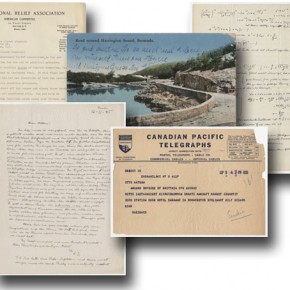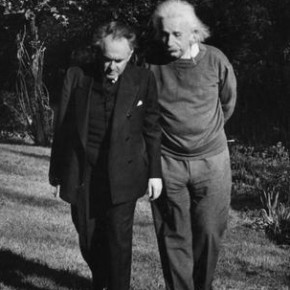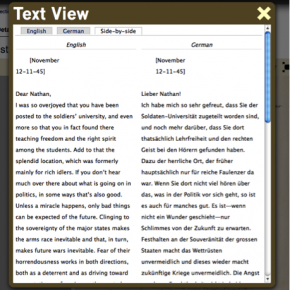Happy birthday, Albert Einstein! Born March 14, 1879, this world-renowned physicist is known for his extraordinary scientific contributions, but perhaps lesser known is his dedication to social and political actions to promote world peace. Vassar is one of a few institutions of higher learning that have papers from Einstein, and our collection documents this social and political work in the United States and abroad, with special attention to Jewish affairs. Recently, in collaboration with Caltech, Princeton University Press, and Hebrew University, and made possible by a generous grant from alumna Dr. Georgette Bennett in honor of Dr. Leonard Polonsky CBE, our collection was fully digitized, transcribed, and translated — and is available at http://einstein.digitallibrary.vassar.edu.
Features of the Vassar collection
As an undergraduate institution, we knew that we wanted both new and seasoned Einstein researchers to be able to use our collection, which focuses mainly on the post-World War II years of Einstein’s life and contains letters from Albert Einstein, his wife Elsa Einstein, and Vassar professor (and executor of Einstein’s estate) Otto Nathan. One of the best ways to meet this need was to translate our collection from German to English. We reached out to the editors of The Collected Papers of Albert Einstein at Caltech to provide an official transcript and translation of each letter. We also worked to create a new viewer for our digital library collections to provide a side-by-side view of the English and German texts, and made the writings fully searchable. Here is one example:
This item allows us – English and German speakers alike – to read Einstein’s powerful writings about the role of physicists in creating world peace:
German:
Die Physiker benehmen sich gut, indem sie alle gegen die Geheim-Rüsterei sind und für Verhütung der Kriege auf internationaler Basis sind; sie scheuen sich aber, die letzten Konsequenzen zu ziehen—Weltregierung die allein über Militär-Macht verfügt.
English:
Physicists are conducting themselves well in that they are all against secret armament and in favor of the prevention of war on an international basis; they shy away, however, from acknowledging the ultimate conclusion—world government that alone is equipped with military power.
Many more letters about Einstein and his views on world peace are available, such as Einstein’s manuscript discussing war, politics, and world cooperation (c. 1948).
The Einstein-Vassar connection

A selection of Einstein materials available at http://einstein.digitallibrary.vassar.edu
After his emigration from Germany in 1933, Albert Einstein began his work at the Institute for Advanced Study at Princeton University. One of the people he got to know at Princeton was Otto Nathan. Nathan was an economist who had served as an adviser to the German government from 1920 to 1933. In 1927 he was a German delegate to the World Economic Conference, held in Geneva. Like so many others, Nathan left Germany after Hitler’s rise to power. He came to the United States and taught at several institutions of higher learning, including Princeton (1933-35), New York University (1935-42), Vassar (1942-44), and Howard University (1946-52). Nathan also published a number of articles and books on economic subjects, such as Nazi War Finance and Banking and The Nazi Economic System: Germany’s Mobilization for War.
Einstein and Nathan had similar backgrounds and common interests, and a friendship quickly developed between them. They began to correspond regularly, discussing a variety of issues and topics. After Nathan left Princeton in 1935, they maintained close personal ties; for instance, Nathan played an important role by taking care of many of Einstein’s legal, financial, and real estate matters. The two professors also collaborated on several social and political issues of the day. The great trust and confidence that Einstein felt for Nathan was expressed most clearly in his will of 1950. In this document Einstein named Nathan the sole executor of his estate, and further designated him a joint trustee, along with Helen Dukas, the scientist’s longtime secretary.
Einstein died in April 1955. In the months and years following, Nathan devoted himself to the work of serving as Einstein’s executor. Eventually, a series of correspondence and other materials made their way to Vassar College.
To read more about this connection, visit http://specialcollections.vassar.edu/exhibit-highlights/einstein/essay1.html
The Albert Einstein Digital Collection at Vassar College Libraries was made possible by a generous grant from alumna Dr. Georgette Bennett in honor of Dr. Leonard Polonsky CBE.


